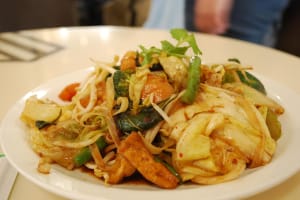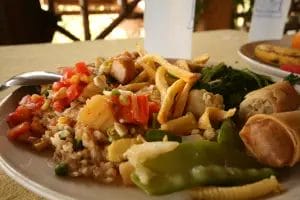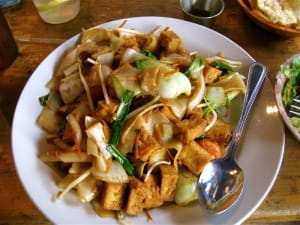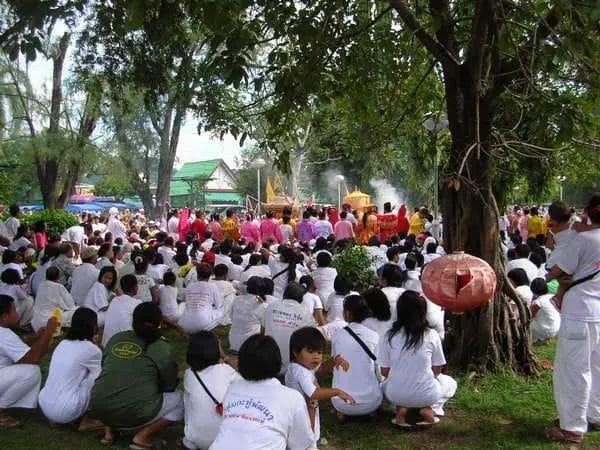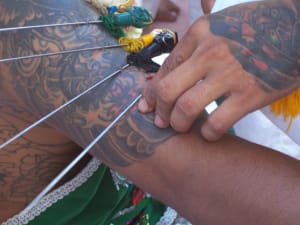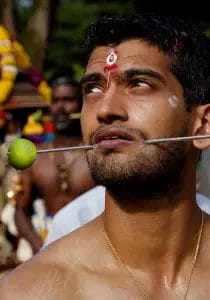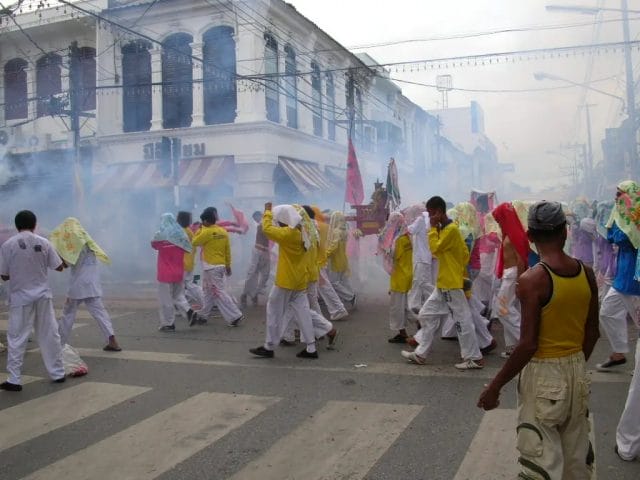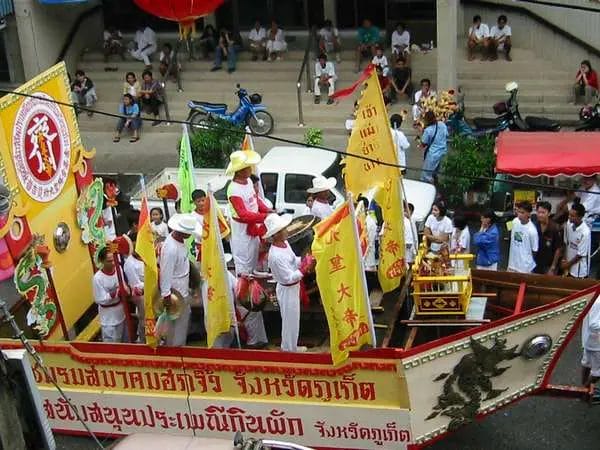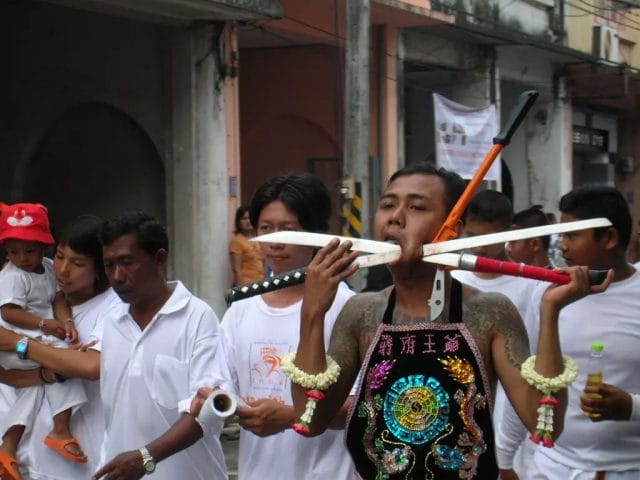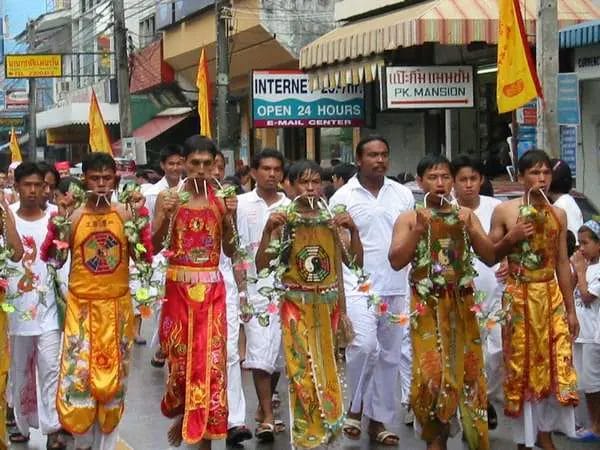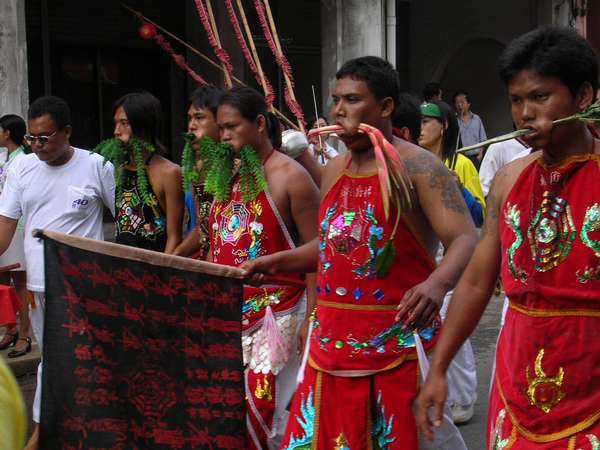Thailand Vegetarian Festival
Last Updated on August 29, 2017
## Vegetarian Festival on the Thai Calendar
Every year, the people of Thailand celebrate a vegetarian festival. This Thailand festival begins on the 15th day of the waning of the 10th month of the Thai lunar calendar. This can occur during the months of September or October in any given year. Many Thai people observe this vegetarian festival, even if they do not eat Thai vegetarian food throughout the rest of the year. The festival is popular throughout Thailand, and especially in areas with large populations of Chinese immigrants, such as Bangkok, Chiang Mai, and Phuket.
### Dates for the Thailand Vegetarian Festival 2017
– The Thai Vegetarian Festival will be held from Friday, 20 October to Saturday, 28 October, 2017.
– Thailand Vegetarian Festival 2017 takes place for nine days. (Some Thai people will hold the precepts for a total of 10 days.)
– This festival officially starts on 20 October, but some events begin a day or two before, and can continue a day after, depending on the temples and organizing committee involved.
**Note: in 2014 there are two *Ninth Months* in the Chinese Lunar Calendar. This means that there will be two Vegetarian festivals for the faithful. The second one will not be celebrated in the same visible way in Chiang Mai or Phuket (or elsewhere) but rather a much smaller event – no street processions but maybe some festival activities at certain shrines, and of course vegetarian food.**
### Dates for the Thailand Vegetarian Festival 2018
– Date of Year 2018 still TBA
Many Thai people observe this vegetarian festival, even if they do not eat Thai vegetarian food throughout the rest of the year. Some Thai people practice Thai vegetarianism every Buddha day (full moon), and/or on the day of the week of their birth (which has a special meaning for the individual).
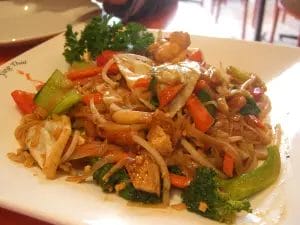
## The Practice of Vegetarianism in Thailand
During this Thai festival, Thai people practice (เจ, pronounced _jay_). The word jay is taken from Chinese Mahayana Buddhism, and it means eight precepts observance. One of the eight precepts is the avoidance of eating any animal meat during the vegetarian festival. When a Thai person practices jay, they also keep up a high moral standard of good deeds in their action, words, and thoughts. Thai people have a saying for this Jay eating and religious precept observance, which is teu sil gin jay, or hold the precepts, eat jay. During the festival, Thai people practicing jay must keep their body clean, keep their eating utensils clean, and make sure they do not share utensils with people not observing the Thai vegetarian festival. They must wear white clothing as often as possible, avoid killing or harming animals, and be mindful of their actions and thoughts. During the Thailand vegetarian festival, devotees abstain from sex and alcohol.
## Thailand Vegetarian Diet
Jay food goes beyond a Western vegetarian diet, excluding some vegetables and spices as well. These include pungent vegetables such as garlic or onions, because they are believed to inflame the passions and lead people to anger or lust. The pungent vegetables cause people to have too much energy and perspiration. Also, unlike Thai cooking, which uses many hot and spicy chili peppers, Chinese vegetarian cooking finds a more even balance between bitter, salty, sour, sweet, and pungent flavors. In addition, Jay vegetarian food is not made with milk or eggs.
## Thailand Vegetarian Festival Celebration
The Thai vegetarian festival is celebrated throughout the country of Thailand, especially in larger cities with higher populations of Chinese immigrants. It is celebrated in the Chinatown areas of Bangkok, known as Yaowarat, and Chiang Mai, known as Warorot. Thai people bring shrines or deities from their homes to Chinese temples to receive spiritual energy. Thai people hang lanterns at the Chinese temples and light candles outside. Loud drums inside and outside the temples scare away evil spirits. Chinese operas perform, and vendors sell toys, fireworks, and of course, delicious vegetarian Jay food and snacks. Thai people celebrate the vegetarian festival each year for spiritual and physical cleansing, merit-making, and to create a sense of inner peace.
## Thai Vegetarian Restaurants
Thai vegetarian restaurants identify themselves with yellow flags, yellow signs, and a Chinese symbol for vegetarianism. Most restaurants in Thailand can prepare Thai vegetarian food if requested by replacing meat with soy protein such as tofu and eliminating the fish sauce and oyster sauce. Other savory ingredients commonly found in Thai vegetarian cooking include soy sauce, soy bean paste, chili and chili powder, lemon grass, coconut milk, galangal root, ginger, coriander, kaffir lime leaves, and sweet Thai basil. Happy Cow has a nice [list of vegetarian restaurants in Thailand](http://www.happycow.net/asia/thailand/) including [vegetarian restaurants in Chiang Mai](http://www.happycow.net/asia/thailand/chiang_mai/), [Bangkok](http://www.happycow.net/asia/thailand/Bangkok/) and [Phuket](http://www.happycow.net/asia/thailand/phuket/).
## Phuket Vegetarian Festival
Thailand’s vegetarian festival is most colorful in Phuket. There the vegetarian festival is celebrated inside and outside Chinese temples throughout the city, as well as during processions between these temples and Phuket Bay. Each temple erects a pole, known as a go teng, or lantern pole, to welcome the Nine Emperor Gods of the Chinese Taoist religion. Each pole is decorated with nine lanterns, and devotees light candles around the poles. Devotees bring shrines or images of deities from their own homes to the temples to receive spiritual energy. Along with the lantern pole, each temple has nine chairs for the gods to sit in. Some temples place statues in the chairs to simulate the invisible gods. These Nine Emperor Gods are associated with the ocean, sea, and sea-faring and may be based on pirates in ancient Chinese literature. The beating of loud drums around the temples and along procession routes scare away evil spirits.
## History of the Phuket Vegetarian Festival
Phuket’s Vegetarian festival (or jia chai in local Hokkien Chinese dialect) began in 1825. The governor of Thalang, Praya Jerm, moved the island’s principal town from Ta Reua in Thalang District to Get-Hoe in Kathu District, where there were tin mines and Chinese miners. Kathu was then still covered by jungle and fever was rife. It happened that a traveling opera company (called ngiu in Thai or pua-hee in Hokkien dialect) came from China to perform for the miners.
When the whole company grew sick from an unnamed malady, they kept to a vegetarian diet to honor two of the emperor gods, Kiew Ong Tai Teh and Yok Ong Sone Teh. The sickness afflicting the opera troupe then disappeared. This greatly interested the people of Kathu, who asked how it was done. The answer came that ritual vegetarianism with its attendant ceremonies had been the cause, with the result that people embraced the faith enthusiastically.
Thus the festival began: starting the first evening of the ninth lunar month, it continued until the ninth evening. The aim was to bring good luck to individuals as well as to the community.
It later happened that one familiar with the festival volunteered to return to Kansai, in China, where he invited the sacred Hiao Ho-le or Hiao Ian (incense smoke) and Lian Tui (name plaques), which have the status of gods, to come stay in Kathu. He also brought holy writings used in the ceremonies, returning to Phuket on the seventh night of the ninth month. The people, upon hearing of his arrival, went in procession to Bang Niao Pier to bring him and his sacred cargo back. This was the origin of the processions that figure so greatly in the festival.
## Beginning of the Festival – Phuket
The afternoon before the festival begins, a great pole at each temple is raised, called the Go Teng pole, with which the gods are invited to descend. At midnight the pole is hung with nine lanterns, signaling the opening of the festival. Two important gods are also invited down at midnight to preside over ceremonies: Yok Ong Hong Tae and Kiew Ong Tai Tae.
Aside from this, there are other ceremonies throughout the festival, notably:
* Invocation of the gods Lam Tao, who keeps track of the living, and Pak Tao, who keeps track of the dead
* Processions of the gods’ images
* Feats of the Ma Shong, such as bathing in hot oil, bladed ladder climbing and fire-walking
The festival ends with merit making ceremonies at each temple (sadoh kroh) and the send-off of the gods on the final night (when fireworks are at their most impressive).
## Ma Song – Mediums for the Gods
The most unique aspect of the Phuket vegetarian festival is the actions of the mah song. A mah song is a man (or very rarely, a woman) possessed by a god during the vegetarian festival. Mah songs parade through the streets of Phuket, walking across hot coals or exploding fireworks and bathing in hot oil. They pierce their mouths, cheeks, ears, and arms with fish hooks, knives, razor blades and bamboo poles. The deity residing within the mah song protects their body from pain and injury. This is confirmed to onlookers by the fact that that very little blood or scarring occurs.
The word mah song is translated as entranced horses or horses of the gods, because the mah song carries a god within them. A person can be chosen by a god to become a mah song at any time in their life, as long as they are unmarried and celibate at the time. In some cases, purification rituals can qualify a person. Often, a person is contacted during a dream, vision, or period of long illness, and a god tells them that they have been chosen to become a mah song. There are several reason that a mah song may be chosen. The person may be close to impending doom or death, and becoming a mah song extends their lifetime. Also, a person may be rewarded for maintaining good moral qualities during their lifetime.
Ma song, or mediums, are devotees whom the gods enter during the fast. They manifest supernatural powers and perform self tortures in order to shift the evil from the individuals onto themselves, and to bring the community good luck. Ma Song fall into two categories: those who, having had an intimation of impending doom, want to extend their lives; and people specially chosen by gods for their inner moral qualities.
Throughout the festival fireworks and drums are sounded, especially during the ceremonies. It is held that the louder they are the better because the noise drives away evil spirits.
Participants in the fast stick to strict vegetarian diet for a varying number of days, usually no less than three. This they do to make themselves strong in mind and body, they refrain from all vices, eating animal flesh and killing animals. The festival thus promotes food hygiene, brightness, and inner peace.
Well the central players are the Mah Song (entranced horses). The Mah Song are generally ordinary Phuket men and women who become shaman or mediums for the duration of the festival. They are either people who have sensed an impending doom and want to avert their misfortune or they are people chosen by the gods for their moral qualities. The gods occupy their bodies during the festival. These people go into a trance like state and manifest supernatural powers. They feel no pain and inflict self-tortures upon themselves in order to bring good fortune to their communities.
Hundreds of these Mah Song take part in the festival. They march in the processions and perform rituals at the temples. They generally have a group of devotees who assist them through their trance like state.
The self-tortures include skewering their cheeks with all manner of objects such as spears and swords. It seems like every year they try to up the ante by using ever-stranger objects. Bicycles, guns and fruit have been among the objects seen skewered through the Mah Song’s cheeks at recent festivals. They also perform rituals at the temples such as walking across burning coals or climbing blade ladders. They must do all this without the aid of anesthetic.
## Nine Emperor Gods
Sedan chairs carrying the statues of the Nine Emperor Gods are paraded through the streets of Phuket. These are hoisted on men’s backs and rocked violently back and forth to simulate the Nine Emperor Gods sailing on a rough sea. The mah songs walk among the procession in a trance, wearing elaborate costumes with their bodies and faces pierced. The mah songs crack whips in the air or pass out candy to the crowd. Town residents quietly bow their heads in reverence and gratitude when the mah songs pass by, because the pain they inflict upon themselves shifts evil off of town residents. Mah songs bring their community spiritual cleanliness, good luck, and good fortune throughout the coming year. Town residents eagerly reach for and keep napkins and towels used to wipe a mah song’s sweat or blood. On the final day of the Thailand vegetarian festival in Phuket, the chairs are all carried down to Phuket Bay, so that the Nine Emperor Gods can return to the sea.
It is not a totally reckless exercise. The Mah Song are monitored by the event organizers and doctors to make sure there are no serious injuries or infections. There was an amusing story about a Mah Song who lost his nerve at a recent festival. He intended to pierce his tongue with a spear but couldn’t face the pain so he bought a pig tongue and skewered it with the spear. He marched through the entire procession holding the pig tongue between his teeth. His deception was discovered when organizers asked to examine his wound and found he miraculously did not have one. One can sometimes recognize Mah Song going about their normal lives for the rest of the year by the scars on their cheeks.
## Becoming a Vegetarian and Taking Vows of Refuge
* __Jia Shai__ – Consuming foods that consist of vegetables (except for pungent kinds such as garlic, onions, coriander, and flowering garlic chives).
* __Song Geng__ – Praying and taking refuge.
* __Jae Sian__ – Remaining in a state of peace and calm.
## 10 Rules for the Vegetarian Festival
* Cleanliness of bodies during the festival
* Clean kitchen utensils and to use do not join the festival
* Wear white during the festival
* Behave oneself physically and mentally
* No eating meat
* Abstain from sex
* No alcoholic drinks
* People in a period of mourning should not attend the festival
* Pregnant women should not watch any rituals
* Menstruating women should not attend the ritual
One need not follow all the rules to enjoy the festival. The rules are for the participants and participation is not mandatory, one can still watch. However, all people entering the temples should be following these rules. Flaunting these rules can be very upsetting to the local people, not to mention angering the gods.
## The Farewell Ritual – Phuket
The Vegetarian Festival or the Nine Emperor gods Festival culminates in the farewell ritual for the Jade Emperor and the Nine Emperor gods on the evening of the ninth and last day, and comes to close with sending off the Kiu Ong at midnight back to heaven.
The ritual is divided into two parts. The Jade Emperor is bade farewell at the lantern pole in the shrine’s yard by burning the paper palace for the Jade Emperor. Then the nine Emperors are sent off at a body of water, mainly conduct close to sea – Saphin Hin or river, with a large heap of gold paper and multi colored _imperial_ paper costumes.
## Phuket Temples for Vegetarian Festival Activities
The festival activities are centered around the Chinese shrines and temples.
* __Jui Tui Shrine__ – This is the most important Chinese shrine in the vegetarian festival. It is on Ranong Road in the Phuket Old Town district. The entire road will be lined with stalls selling vegetarian food.
* __Bang Neow Shrine__ – Another Chinese shrine in Phuket Town with lots of festival activity. It is on Phuket Road.
* __Kiw Tien Keng Shrine__ – This small shrine is at the end of Saphan Hin in Phuket Town. It is the site of the final ceremony on the last night of the festival when the gods are invited to ascend back to the heavens.
* __Phra Phorm Thada Shrine__ – A Chinese shrine on a side street just off Phattana Road.
* __Sam Kong Shrine__ – A temple on the northern edge of Phuket Town. It is on Yaowarat Road, not far from Tesco Lotus.
* __Sapam Shrine__ – This temple is just on the edge of town on Thepkrassatri Road (the airport road).
* __Tha Rua Shrine__ – This is one of the three temples outside Phuket Town that actively celebrate the festival. They do a procession all the way into Phuket Town and back again. It is on Thepkrassatri Road, just south of heroine’s monument.
* __Kathu Shrine__ – Lots of festival activity here. Kathu was the original location of the festival. They also do a procession all the way into Phuket Town and back again. This nice temple is in Kathu village on route 4020.
* __Cherng Talay Shrine__ – This temple is a long way from Phuket Town but they still get in the spirit of things. It is all the way out near Bang Tao Beach on the west coast.
## The Rituals of the Phuket Vegetarian Festival
Many of the rituals that take place around the festival involve invoking the gods, calling them down from heaven and then sending them back.
On the afternoon before the festival begins, a great pole called the Go Teng is raised at each temple. At midnight, they hang nine lanterns on the pole signalling the opening of the festival. This is an invitation for the nine Chinese gods to descend and join the festival.
There are several more rituals performed around the temples during the festival. Many of them involve the Mah Song enduring acts of pain such as walking over burning coals or climbing blade ladders.
The final ritual of the festival takes place on the last night at Kiw Tien Keng Shrine in Saphan Hin where they invite the gods to ascend back to the heavens.
## The Processions of the Phuket Vegetarian Festival
One of the highlights of the festival is the processions. They take place on each of the final seven days of the festival. On each day, the different temples take turns to make a procession from their temple around Phuket Town and back again. It is the images from these processions that are broadcast around the world.
The processions are big affairs that can take an hour or more to pass. They generally start early in the mornings and finish before lunchtime although the temples also seem to have spontaneous processions around town at other times.
One will see dozens upon dozens of Mah Song march passed with their entourages. They will have skewered their cheeks or other body parts with objects such as ornamental spears, swords and even stranger objects. They march through the town in a trance, shaking their heads from side to side and mumbling incantations. As they go, they will stop to bestow blessings on the people at the roadside, many of whom will have set up tables of offerings.
Throughout the procession a cacophony of drums and firecrackers pound and explode to scare away evil spirits. As well as the Mah Song and their entourages, there are also other groups marching. Community groups, entertainers and schoolchildren join the march to add variety to the show.
Then there is the final march on the last night of the festival. This is a staggering spectacle and one of the absolute highlights of the festival. The fireworks start up in the early evening and do not let up until the procession is finished at around midnight.
The procession starts around 7pm and continues through the evening. As they march through the crowds, they come under an extraordinary bombardment from the onlookers. They throw firecrackers around the marcher’s feet and even their heads. The onslaught is so intense that a haze of acrid smoke fills the air. The parade starts to spread out under the bombardment and turns into more of a charge than a march. It is a stunning sight to see the running figures charging through the noise and smoke while firecrackers flash around them. It is something that more closely resembles a war zone than a religious festival.
Around 11pm the procession starts towards the shrine at Saphan Hin for the final ritual to send the gods back to the heavens for another year. When it is done, the exhausted revelers slowly drift away or maybe if they have been abstaining they take the opportunity to find a few beers.
## Vegetarian Food at the Phuket Vegetarian Festival
Of course one of the 10 rules of the vegetarian festival is that participants must eat vegetarian food (_a-hahn jay_ in Thai). Therefore there is an enormous range of vegetarian food available. There will be vegetarian food stalls around all the participating temples and many of the local restaurants will also serve vegetarian food.
Even non-vegetarians will find it is no great hardship to abstain from meat for a few days as the vegetarian fare is absolutely delicious. Fresh vegetables and fruit are an intrinsic part of the Thai diet. The meat is replaced by soybean and protein substitute products. One can hardly tell the difference between the substitute products and real meat and there is so much variety that one can easily be satisfied for the 9-days of the festival.
## What Visitors should do during the Festival (Phuket)
What one does at the festival depends just how much one wants to immerse oneself into the events. One could devote oneself to the full nine days of the festival or just visit a couple of the events.
It is a good idea to visit Jui Tui Shrine on Ranong Road. One will see people making offerings at the shrine. Feel free to join in. Then go along the road and enjoy some of the vegetarian food. One could make a visit to all of the temples involved in the festival.
One simply must see at least one of the processions. They are one of the main highlights of the festival. Aim to get into town early and find a good spot. If driving then try to park quickly or the vehicle may get caught behind the procession, with nowhere to go.
The ideal location to enjoy the processions is in the old town district around Thalang Road, Krabi Road and Dibuk Road. There are many nice cafes and restaurants where you can relax while you wait for the procession to arrive.
Apart from the temples and the processions, one really should make an effort to see the final night. It is a quite extraordinary experience. Get into town around 7pm to start soaking up the atmosphere. The fireworks will already be going off. Take a walk around to get a feel for things and the procession may already be underway. Maybe take a final chance to grab some vegetarian food. Then find a good viewing spot. The clock circle outside the Metropole Hotel is a popular viewing point. The procession will be charging through under a barrage of firecrackers until around 11pm when everyone starts heading out to Saphan Hin for the final ritual.
## Phuket Vegetarian Festival Schedule for 2015
– For a complete listing of events and other information, see the downloadable brochure at [Phuket Vegetarian](http://www.phuketvegetarian.com/).
—-
Some of the content for this article from [Know Phuket](http://www.knowphuket.com/) and the [Thai Tourism Authority](http://www.tourismthailand.org/).
